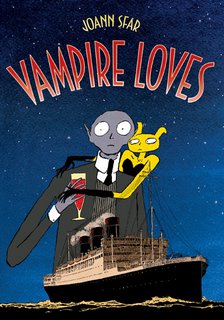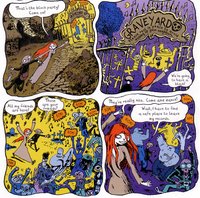Vampire Loves
 It's times like this when I question the self-imposed limits of this blog o' mine. As I look around at the WeboComicsBlogoNet, I see so many barrel-bound fish being shot and I feel a twinge of envy. With the simultaneous release of the end of Infinite Crisis and the beginning of Civil War, it's time to make hay while snark sun is shining down. Even though I enjoyed them both, I could easily savage both installments of crossoveritis for 500 words apiece without breaking a sweat. But Focused Totality is about the writing exercise, and it's been said that there is no gain without the pain.
It's times like this when I question the self-imposed limits of this blog o' mine. As I look around at the WeboComicsBlogoNet, I see so many barrel-bound fish being shot and I feel a twinge of envy. With the simultaneous release of the end of Infinite Crisis and the beginning of Civil War, it's time to make hay while snark sun is shining down. Even though I enjoyed them both, I could easily savage both installments of crossoveritis for 500 words apiece without breaking a sweat. But Focused Totality is about the writing exercise, and it's been said that there is no gain without the pain.
Which is all a roundabout way of getting to the difficulty of writing about Joann Sfar's Vampire Loves, another title in the impressive launch of First Second Books. I've written before about all true art aspiring "towards the condition of music", and Vampire Loves does just that. Pinning down and critiquing this book is like trying to write about a Keith Jarret solo or a song by Leonard Cohen. I'm at a loss for words beyond "I enjoyed it" or "read it, you'll like it". It's a simple enough book, with a feel reminiscent of early Woody Allen. If Woody was just a touch less neurotic. And if Woody was not a New York Jew, but a Latvian Vampire. Ferdinand the Vampire is a simple soul who only uses one fang when biting, is careful not to kill, keeps a pathetic-looking cat, and listens to Les Freres Jacques. And he loves. He drifts from woman to woman and relationship to relationship in a search for acceptance and companionship. He can never say no, and can never make up his mind. There's a very distinctly European sensibility to the book, one that captures the clash of eras that is inherent in the Old World, but completely absent in America. Scenes abruptly shift from ancient castles to danceclubs, and includes rave parties held in graveyards that probably predate the formation of the USA. Ferdinand is adrift in time and in his relationships, at a disjoint with everything around him.
It's a simple enough book, with a feel reminiscent of early Woody Allen. If Woody was just a touch less neurotic. And if Woody was not a New York Jew, but a Latvian Vampire. Ferdinand the Vampire is a simple soul who only uses one fang when biting, is careful not to kill, keeps a pathetic-looking cat, and listens to Les Freres Jacques. And he loves. He drifts from woman to woman and relationship to relationship in a search for acceptance and companionship. He can never say no, and can never make up his mind. There's a very distinctly European sensibility to the book, one that captures the clash of eras that is inherent in the Old World, but completely absent in America. Scenes abruptly shift from ancient castles to danceclubs, and includes rave parties held in graveyards that probably predate the formation of the USA. Ferdinand is adrift in time and in his relationships, at a disjoint with everything around him.
Sfar's art is a wonder, with very plain grid layouts that somehow manage to feel free and open. It's almost works musically, with a standard six-panel page establishing a backbeat for the melody of the panel's interiors. The pages flow easily, never calling attention to themselves as composition. It is art that completely exists in service to the story, and demonstrates a confidence in subtlety and simplicity that isn't often seen. It all has an ease and a peace that works perfectly with Ferdinand's constantly bemused and confused state.
All this blathering still doesn't describe the sheer pleasure I had reading Vampire Loves. So, I need to retreat to the basics: "I enjoyed it ... read it, you'll like it"

No comments:
Post a Comment